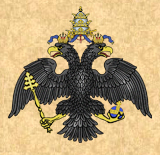|

RESCRIPT:
Authority to Grant Titles and Honours 10 May 2024
The
United Roman-Ruthenian Church and Pontifical Imperial State combined
constitute a unique entity that has maintained its historic
authority and fons honorum, allowing it to grant legitimate titles of
nobility, knighthoods, and other honours. The roots of the United
Roman-Ruthenian Church and Pontifical Imperial State's authority can be
traced back to the early days of Christianity. As the Roman Empire
began to decline, the Christian Church, historically of both Orthodox
and Catholic nature, emerged as a powerful force, both spiritually and
politically. Over time, the Church's influence grew, and it became
intertwined with the various monarchies and aristocracies of Europe.
The
ecclesiastical predecessors of the modern United Roman-Ruthenian Church
and the temporal predecessors of the modern Pontifical Imperial State,
in particular, developed a strong presence in both the Latin west and
the eastern regions of Europe, including present-day Russia, Belarus,
and Ukraine.
The Fons Honorum: The Source of Honours
One
of the most significant aspects of the United Roman-Ruthenian Church
and Pontifical Imperial State's authority is its role as the fons
honorum, or the source of honours. This means that the Church has the
power to grant titles of nobility, knighthoods, and other honours to
individuals who have demonstrated exceptional service or loyalty to the
Church. The concept of the fons honorum dates back to the medieval
period, when the Church and the various monarchies of Europe worked
closely together to maintain social order and stability. The Church's
ability to grant honours was seen as a way to reward those who had
shown devotion to the faith and to the ruling authorities.
Types of Honours Granted by the United Roman-Ruthenian Church and Pontifical Imperial State
The
United Roman-Ruthenian Church and Pontifical Imperial State grants a
wide range of honours, including titles of nobility, knighthoods,
religious honours, academic honours, and other awards and ranks. These
honours are typically granted to individuals who have demonstrated
exceptional service to the Church, to their communities, or to society
as a whole. The process of granting honours is carefully regulated by
the Church, and recipients are expected to uphold the highest standards
of conduct and moral character.
Current Significance As
the world continues to evolve and change, the United Roman-Ruthenian
Church and Pontifical Imperial State remains a bastion of tradition and
a guardian of the values and principles that have shaped European
civilization for centuries. Its authority and fons honorum remain
an enduring legacy. Incorporated States
Titles
granted by the individual "incorporated states and houses" that are
sovereign houses that are part of the Pontifical Imperial State follow
their own established procedures. However, all such acts are officially
recognized by the Church automatically.
Other Notes Unfortunately,
not everyone accepts everything in the world, no matter the source, and
there will always be those who like to question and complain. Some
think, for example, that only Charles III of England can grant "real"
titles or that U.S. citizens can't receive titles. Neither of those are
true.
It is important to remember that
naysaying individuals are often motivated by their own personal
biases or agendas, and their criticisms may not be based on factual
information. In situations like these, the best approach is to ignore
them. Engaging with those who are determined to find fault or sow
discord is often a futile endeavor, and can even give them the
attention they crave. Instead, focus on providing clear, factual
information to those who are genuinely interested in understanding the
situation.
By taking this approach, we can ensure that the
important details and context surrounding the titles and the Pontifical
Imperial State are properly communicated, without getting bogged down
in unproductive debates or complaints.
[Office of State]
[Curia]
[Main
Page]

DISCLAIMER, LEGAL, AND COPYRIGHT NOTICES |

